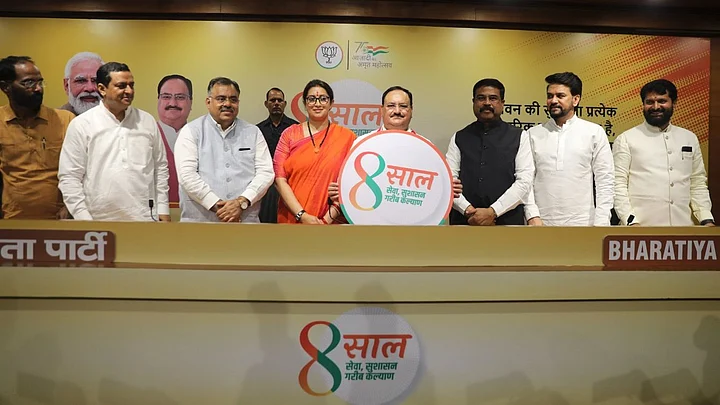Making the Bharatiya Janata Party's (BJP) first official statement on the Vishwanath Temple-Gyanvapi mosque issue, the saffron party's president JP Nadda on Monday, 30 May, said that such matters would be "dealt with in accordance with the Constitution and the ruling of courts" and the party would "follow it in letter and spirit".
"We have always been talking about cultural development. But these issues are dealt with in accordance with the Constitution and the ruling of courts. So, the Court and Constitution will decide on it, and the BJP will follow it in letter and spirit," BJP chief Nadda said while speaking to reporters on the eve of the eighth anniversary of the Narendra Modi government at the Centre.
Union ministers Smriti Irani, Dharmendra Pradhan, and Anurag Thakur were also present at the event.
Meanwhile, a top government functionary said on Monday that the BJP has not said anything on the Kashi and Mathura disputes and would go by the court's decision, reported The Indian Express.
On being asked about the party's stance on the same, the functionary said that people might have different opinions and views, "but BJP as a party has not said anything on this."
"We cannot stop people from interpreting the law the way they want," the functionary said. "We will go with the decision of the courts."
'No Resolution After June 1989 Palampur One on Ram Janmabhoomi': Nadda
On being asked whether reclaiming the temples at Kashi and Mathura was on BJP's agenda, Nadda said that the Ram Janmabhoomi matter was a part of the resolution passed in the party's national executive held in Palampur but added that there had been no resolution after that.
The BJP had taken up the Ram Janmabhoomi movement as part of its political agenda after the Palampur resolution of June 1989. The same had been carried out by the Vishwa Hindu Parishad (VHP) until then. A Rath Yatra had been announced by LK Advani to ensure that "a temple is constructed at the birthplace of Lord Ram".
'Our Conduct Is on the Principle of a Strong Nation, One Nation': Nadda
Meanwhile, JP Nadda rejected suggestions that a certain section of the population felt alienated under the Modi government and said that the party was ready to take everyone along to build a strong nation.
"When we work politically, it is our endeavour to take everyone along. We have to be ready for it. We are ready for it," Nadda said. "There are many types of people in a society. Some respond earlier, some later, some after decades, and some respond after much time has passed. It depends on them. But our conduct is on the principle of a strong nation, one nation. This is clear, and everyone will have an equal share."
Nadda added that the Prime Minister Modi-led government works on the principle of "Sabka Saath, Sabka Vishwas, Sabka Prayaas."
Commenting on the Uttarakhand government's decision to form a committee for formulating a Uniform Civil Code, Nadda said, "It is okay. They (Uttarakhand) are discussing it. As far as we are concerned, we have been saying that everyone must be treated equally. Our broad outline is justice to all, appeasement of none. This is our basic principle, we are working in accordance with it."
Nadda added that India's political culture had changed under the Modi government, which has brought in a responsive, responsible and proactive government.
"Seva, sushasan and garib kalyan (service, good governance, and welfare of poor)" is the soul of the Modi government, Nadda said.
The party also released a theme song titled 'Modi government architect of new India', highlighting Ram Temple's construction in Ayodhya and the Kashi Vishwanath corridor in Varanasi. It also offered a glimpse of the Krishna Janmabhoomi temple in Mathura.
BJP also launched a new module of the NaMo App to "take the youth through innovation and make them aware of the works done by the government for them".
'Pandemic, Ukraine War Created Problems but Government Kept Growth Rate Intact'
Talking about the challenges faced by the government since coming to power in 2014, Nadda said, "First of all, the culture of India has changed, and we have brought in last-mile delivery in the governance process. The biggest challenge was to see that the policies were implemented in letter and spirit. Modi himself has taken care of this – for which he had to shake the system, and that process has disturbed many."
Nadda added that the pandemic and Ukraine war created problems for the Centre, but the government managed to keep the growth rate intact, which ultimately helped in taking care of the issue of unemployment.
(With inputs from The Indian Express.)
